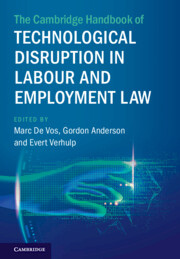
-
Select format
-
- Publisher:
- Cambridge University Press
- Publication date:
- December 2023
- December 2023
- ISBN:
- 9781108878647
- 9781108840057
- Dimensions:
- (254 x 178 mm)
- Weight & Pages:
- 0.94kg, 450 Pages
- Dimensions:
- Weight & Pages:
- Series:
- Cambridge Law Handbooks
- Collection:
- Cambridge Law Handbooks
You may already have access via personal or institutional login- Series:
- Cambridge Law Handbooks
- Collection:
- Cambridge Law Handbooks
Book description
Whether through gig work, remote work, or platforms such as Uber, new technologies are reshaping the very fabric of employment relations. This handbook offers a comprehensive, international overview of how institutions, countries, and legal systems are responding to the technological disruption of the work world. Chapters outline the reform agendas driven by the International Labour Organization and the European Union and detail the public policy debates, litigation, and legal reforms that technological innovation has triggered around the world. This volume provides a post-pandemic assessment of how digitalization is affecting employment and employment relations and contextualizes current technological disruption with a long-term view of how labour and employment law could evolve further.
Contents
Metrics
Altmetric attention score
Full text views
Full text views help Loading metrics...
Loading metrics...
* Views captured on Cambridge Core between #date#. This data will be updated every 24 hours.
Usage data cannot currently be displayed.
Accessibility standard: Unknown
Why this information is here
This section outlines the accessibility features of this content - including support for screen readers, full keyboard navigation and high-contrast display options. This may not be relevant for you.
Accessibility Information
Accessibility compliance for the PDF of this book is currently unknown and may be updated in the future.


